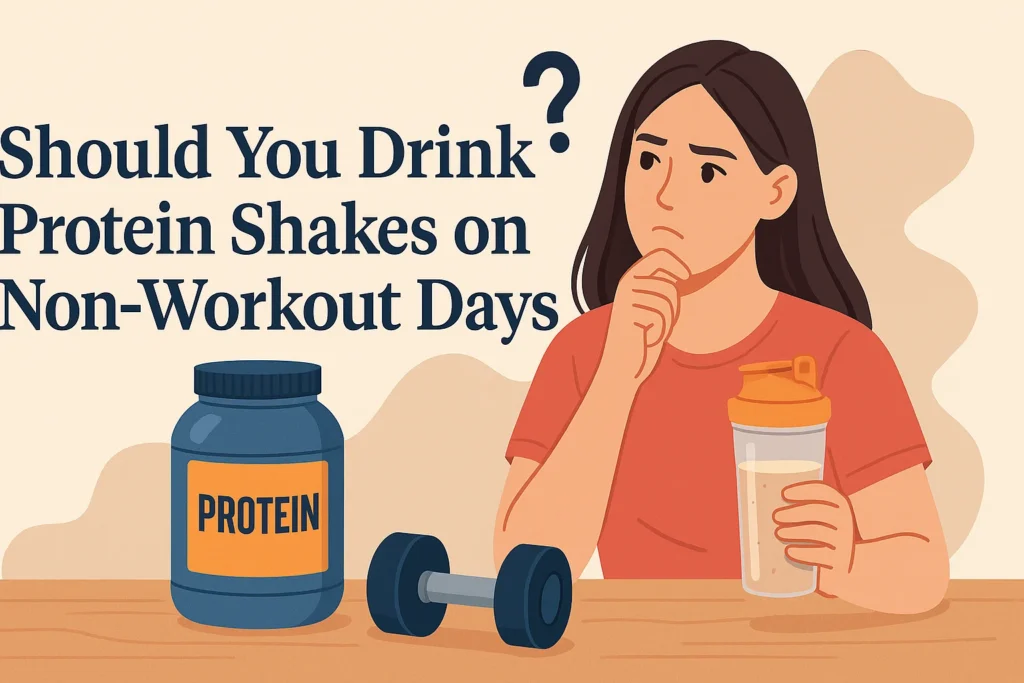You’ve just wrapped up an intense week of training and now it’s time for your well-deserved rest day. As you glance at your tub of protein powder sitting on the kitchen counter, a common question arises: “Should I still have my protein shake today, even though I’m not working out?” This question has sparked debates among fitness enthusiasts, with opinions varying widely. Whether you’re looking to build muscle, lose weight, or simply maintain your current physique, understanding the role of protein shakes on non-workout days can significantly impact your results.
The Critical Role of Protein in Your Body
Protein is far more than just a muscle-building nutrient—it’s a fundamental building block for nearly every cellular process in your body. Composed of amino acids, protein serves as the construction crew for repairing damaged tissues, creating enzymes, producing hormones, and supporting immune function.
When you exercise, particularly during resistance training, you create microscopic tears in your muscle fibers. This damage triggers your body’s repair process, which requires protein to rebuild those fibers stronger than before. This muscle protein synthesis (MPS) is the foundation of strength gains and muscle growth.
But here’s what many people miss: this repair and growth process doesn’t stop when you leave the gym. In fact, it continues for 24-48 hours after your workout, making protein intake just as important—if not more critical—on your rest days.
As registered dietitian Fuad Al Qudsi explains, “That window of time after you exercise is when your body is just a little bit more efficient at utilizing protein to help build muscle, versus while you’re exercising and you’re breaking down the muscle and stressing the muscle.”
Understanding Muscle Recovery on Rest Days
Rest days aren’t about doing nothing—they’re active recovery periods where your body works overtime to repair itself. During this time, your muscles are especially responsive to protein, using amino acids to mend those microscopic tears and prepare for future challenges.
According to research published in the Journal of the International Society of Sports Nutrition, muscle protein synthesis can remain elevated for up to 72 hours after an intense workout. This means your muscles are still actively rebuilding themselves even when you’re taking a day off from the gym.
John Christie, registered dietitian and Tonal’s Director of Applied Training Science, emphasizes this point: “You’ll set your protein target based on your weight or lean body mass and that won’t change on workout vs. non-workout days, so staying consistent with your protein intake is ideal.”
In essence, your rest days are when the real magic happens. While your workouts provide the stimulus for growth, it’s during recovery that your body actually builds that new muscle tissue—and it needs protein to do so effectively.
The Benefits of Drinking Protein Shakes on Rest Days
1. Supporting Continued Muscle Recovery and Growth
One of the primary benefits of consuming protein shakes on non-workout days is maintaining the muscle repair process. Your muscles don’t know it’s a rest day—they’re still busy rebuilding after your previous training sessions.
As noted in ISSA’s fitness research, “Even when you’re not actively training, your body is constantly breaking down and rebuilding muscle tissue. Consuming protein on rest days ensures a steady supply of amino acids to support this process.”
2. Maintaining Consistent Protein Intake
Meeting your daily protein requirements can be challenging, especially if you have high targets. Protein shakes offer a convenient, cost-effective way to maintain consistent intake.
Rachel MacPherson, a certified personal trainer, points out that “studies show you should also get enough protein on rest days. Rest and recovery require protein, carbohydrates, and fats to support tissue healing and muscle growth.”
The American College of Sports Medicine recommends that athletes consume between 1.2-2.0 grams of protein per kilogram of body weight daily—regardless of whether it’s a training or rest day. For someone weighing 150 pounds, that’s approximately 82-136 grams of protein daily.
3. Managing Hunger and Supporting Weight Loss
Protein has a high satiety value, meaning it helps you feel fuller for longer periods. On rest days, when you might be burning fewer calories, protein shakes can help manage hunger and prevent overeating.
“Protein shakes can be a quick, easy way to get in some high-quality protein with or between meals,” notes registered dietitian Fuad Al Qudsi. This can be particularly beneficial when trying to lose weight, as controlling hunger in a calorie deficit can prevent you from overeating.
4. Providing Convenience in Meeting Nutritional Goals
Let’s face it—preparing protein-rich meals for every feeding can be time-consuming. Protein shakes offer a quick solution without the need for cooking, making them perfect for busy lifestyles.
Andreas Abelsson from StrengthLog highlights this benefit: “They can be especially helpful if you have a small appetite and struggle to meet your protein needs through food alone.”
Potential Considerations When Using Protein Shakes on Rest Days
While protein shakes can be beneficial on non-workout days, there are several factors to consider to ensure they’re enhancing—not hindering—your progress.
Caloric Balance and Management
Protein shakes add calories to your diet, and on days when you’re less active, you need to be mindful of your overall energy intake. A typical protein shake can contain anywhere from 100-300 calories, which adds up quickly if you’re not accounting for them in your daily total.
Amber Sayer, a certified personal trainer and running coach, explains, “If you add protein shakes to your diet on rest days without making compensatory reductions elsewhere in what you’re eating, and you are in a net caloric surplus by doing so, you will gain weight.”
This is particularly important for those focused on weight loss. While protein can help manage hunger, the additional calories must still fit within your daily energy budget.
Risk of Excessive Protein Consumption
There is such a thing as too much protein. The body can only use a certain amount of protein at once for muscle protein synthesis, and excess protein doesn’t automatically translate to more muscle growth.
According to Vivo Life, “For example, a pro athlete needs a maximum of 1.8g of protein per kilogram of body weight. Those of us who aren’t professional athletes definitely need less protein than that, and for anyone drinking protein shakes without exercising, you might find that the extra calories lead to fat gain, as you won’t be building muscle tone.”
While healthy individuals can handle higher protein intakes, excessive consumption may place unnecessary stress on the kidneys in some cases. It’s always best to aim for appropriate protein levels rather than assuming more is always better.
Quality and Composition of Protein Shakes
Not all protein shakes are created equal. Some contain added sugars, artificial ingredients, or excessive fillers that may not align with your nutritional goals, especially on rest days when your energy expenditure might be lower.
“Some protein shakes contain high amounts of added sugars and calories, which can send glucose levels soaring,” warns Awesome Health Club. The sugar content in protein shakes can range from zero to 30g per serving, which is significant considering the recommended daily sugar intake for adults is around 30g total.
How to Approach Protein Shakes on Non-Workout Days
Adjusting Intake Based on Your Goals
How you incorporate protein shakes on rest days should align with your specific fitness goals:
For muscle building: Maintaining high protein intake on rest days supports continued muscle protein synthesis. Consider using a complete protein source like whey or a plant-based blend that includes all essential amino acids.
For weight loss: Protein shakes can replace higher-calorie meals or snacks, helping create a calorie deficit while preserving muscle mass. Focus on lean protein sources with minimal additives.
For maintenance: A moderate approach works well, using protein shakes to supplement whole food intake when convenient or necessary.
Timing Considerations
Unlike workout days where timing can be more strategic, protein timing on rest days is generally less critical. What matters most is meeting your total daily protein requirements.
“On rest days, when you drink your protein shake isn’t as important as on workout days,” explains Earth Chimp. “The total amount of protein you eat throughout the day matters more than when you have it.”
However, some find benefits in specific timing approaches:
- Morning: A protein shake for breakfast can start your day with steady energy and reduced hunger.
- Between meals: Using shakes as snacks can help manage hunger between meals.
- Before bed: A slow-digesting protein like casein may support overnight recovery.
Types of Protein for Rest Days
Different protein types offer varying benefits that may be particularly useful on non-workout days:
- Whey protein: Fast-absorbing and complete in amino acids, whey is versatile for any time of day.
- Casein protein: Digests slowly, making it ideal for before bed to provide a sustained release of amino acids overnight.
- Plant-based proteins (pea, rice, hemp): Good alternatives for those avoiding animal products, with pea protein showing comparable effectiveness to whey in some studies.
- Collagen protein: While not complete for muscle building, it may offer benefits for skin, joint, and connective tissue health.
Balancing Protein Shakes With Whole Foods
While protein shakes are convenient, they shouldn’t replace a varied diet of whole foods. A balanced approach often yields the best results.
Kate Patton, a registered dietitian at Cleveland Clinic, advises: “Whatever your goals, it’s best to focus on the amount of protein you need each day. You want to space out your protein intake throughout the day for maximum results—and adding a protein shake to your routine post-workout can be a good way to reach that target.”
Whole foods provide additional nutrients that protein shakes may lack, including:
- Fiber for digestive health and satiety
- Essential vitamins and minerals
- Healthy fats for hormone production and cell function
- Antioxidants and phytonutrients for overall health
A good approach is to view protein shakes as a supplement to—not a replacement for—whole food protein sources like lean meats, fish, eggs, dairy, legumes, and plant proteins.
Recommendations Based on Specific Fitness Goals
For Muscle Building
If your primary goal is building muscle mass, protein consistency is key. Research suggests aiming for 1.6-2.2 grams of protein per kilogram of body weight daily (0.7-1 gram per pound).
“If you’re aiming to bulk up and gain muscle, drinking protein shakes on rest days is definitely beneficial,” advises Amber Sayer. “You can make energy-dense protein shakes by adding ingredients such as avocados, nuts, oats, etc. to pack in extra calories and nutrients.”
Consistency in protein intake across all days of the week supports optimal muscle protein synthesis and prevents catabolism (muscle breakdown).
For Weight Loss
When losing weight, protein becomes even more important to preserve lean muscle mass while in a calorie deficit.
“If you are looking to lean out and get more cut, you can still drink protein shakes on rest days, but you will either want to make compensatory dietary adjustments—like substituting a protein shake for a regular meal—or drink a low-calorie protein shake made with just plain water or unsweetened almond milk,” recommends Marathon Handbook.
Protein’s satiating effect can help manage hunger while dieting, making it easier to maintain a calorie deficit without excessive hunger.
For Athletic Performance and Recovery
Athletes focusing on performance rather than aesthetics still benefit from consistent protein intake on rest days.
John Christie from Tonal notes: “Since muscle growth occurs as you’re recovering from strenuous exercise, it makes sense that you should consume just as much protein on your non-workout days.”
For optimal recovery, pair your protein intake with other recovery-enhancing practices like proper hydration, quality sleep, and stress management.
Practical Guidelines for Protein Shake Use on Rest Days
To maximize the benefits of protein shakes on non-workout days while avoiding potential pitfalls, consider these practical guidelines:
Track your total daily protein intake: Ensure you’re hitting your protein targets consistently across both workout and rest days.
Account for calories: Include protein shake calories in your daily total, especially if weight management is a goal.
Choose quality products: Look for protein powders with minimal additives, fillers, and added sugars.
Consider mixing options: On rest days, try blending your protein with nutrient-dense additions like fruits, vegetables, or healthy fats to create a more complete meal.
Adjust based on feeling: Pay attention to hunger, energy levels, and digestion to fine-tune your approach.
Cycle your approach: Consider cycling periods of higher and lower protein intake based on training phases and goals.
Prioritize hydration: Maintain adequate fluid intake, especially with higher protein consumption.
The Bottom Line: Should You Drink Protein Shakes on Rest Days?
The evidence suggests that yes, for most people with active lifestyles, consuming protein shakes on non-workout days can be beneficial. Your muscles don’t stop needing protein just because you’re not exercising that day—in fact, they may need it even more as they recover from previous workouts.
However, the approach should be personalized based on your unique goals, preferences, and nutritional needs. There’s no one-size-fits-all answer, but the science points to maintaining consistent protein intake across all days of the week for optimal results.
As summarized by StrengthLog: “Protein shakes are not a magic bullet. They won’t help you build muscle, lose weight, or improve your athletic performance if you’re not also following a healthy, balanced diet and exercise routine. However, as part of such a routine, protein shakes can definitely help you reach your daily protein goals and, therefore, your fitness goals faster.”
The key is finding the approach that works best for your body, lifestyle, and goals—and that may very well include enjoying that protein shake on your well-deserved rest day.
Key Takeaways
- Muscle repair and growth continue for 24-72 hours after exercise, making protein intake important on rest days.
- Your daily protein requirements don’t significantly change between workout and non-workout days.
- Protein shakes can be a convenient way to maintain consistent protein intake, manage hunger, and support recovery.
- Consider your total daily calories and overall diet quality when incorporating protein shakes on rest days.
- Personalize your approach based on your specific goals—whether building muscle, losing fat, or maintaining fitness.
- Quality matters—choose protein supplements that align with your nutritional philosophy and preferences.
Remember, protein shakes are just one tool in your nutrition toolbox. They work best as part of a well-rounded diet that prioritizes whole, nutrient-dense foods and supports your active lifestyle.


